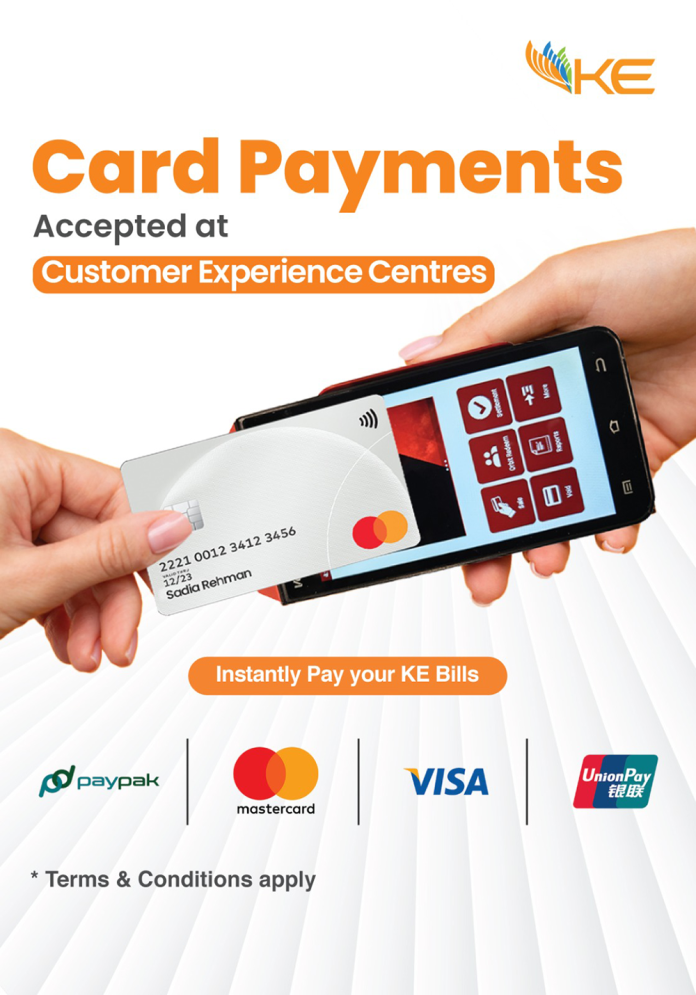For decades, electricity bill payments in Karachi followed the same routine long queues, cash payments, and time-consuming visits to service centers. But the landscape is shifting. As industries across Pakistan embrace digital solutions, K-Electric (KE) is taking the lead with an industry-first initiative: introducing Point-of-Sale (POS) terminals for seamless, cashless bill payments.
This pioneering move makes KE the first power utility in Pakistan to enable customers to pay their bills using debit and credit cards, offering greater ease, security, and efficiency, while redefining the customer experience and setting a new industry benchmark.
KE’s POS payment system eliminates the hassle of cash transactions. Customers can now visit any KE service center, tap or swipe their card, and complete their bill payment instantly. The system retrieves the bill amount automatically, reducing errors and ensuring a fast, transparent, and secure transaction.
Pakistan’s digital economy is expanding rapidly. In FY24, digital transactions surged by 35%, increasing from 4.7 billion to 6.4 billion, while transaction value rose from PKR 403 trillion to PKR 547 trillion. Despite this momentum, utility payments have largely remained cash-dependent until now. KE’s industry-first POS initiative bridges this gap, aligning Pakistan’s power sector with the country’s broader shift toward digital finance.
KE’s move mirrors a growing global trend where leading power companies have adopted POS and other digital payment solutions, for instance, in the United States, Duke Energy and Pacific Gas & Electric (PG&E) have implemented POS payment terminals at service centers, allowing customers to securely pay their bills with debit and credit cards. European providers such as EDF in France and EON in Germany have also integrated POS terminals at physical locations, partnering with local retailers to enable quick, hassle-free transactions. In Japan, Tokyo Electric Power Company (TEPCO) has introduced real-time POS-based payments through digital kiosks and convenience stores, while in Singapore, SP Group has fully adopted POS-driven digital payments for streamlined bill settlements. KE’s new initiative places Pakistan’s power sector on this global trajectory, offering consumers the same level of convenience and security that has become standard in many other parts of the world.
The introduction of POS terminals is just one part of KE’s broader commitment to digitalization. The company is expanding cashless payment options beyond service centers, integrating with mobile apps, banks, and retail outlets. Customers can also pay their bills instantly via WhatsApp and the KE website, offering even greater flexibility. To further enhance accessibility, KE has introduced AI-powered chatbot (Kineto) that provide 24/7 customer support, answer billing queries, and guide users through the payment process. KE is also advancing toward a paperless billing system, reducing environmental impact and reinforcing its commitment to sustainability.
KE’s industry-first POS initiative represents more than just a payment upgrade—it’s a step toward financial inclusion, operational efficiency, and enhanced customer empowerment. By eliminating cash-handling risks, reducing transaction times, and improving transparency, KE is setting a new benchmark for the power sector while encouraging broader adoption of digital payments across Pakistan.
As the country moves toward a cashless economy, KE is not just adapting, it’s leading the charge. The future of utility payments is digital, seamless, and customer-centric and KE is at the forefront of this transformation.


